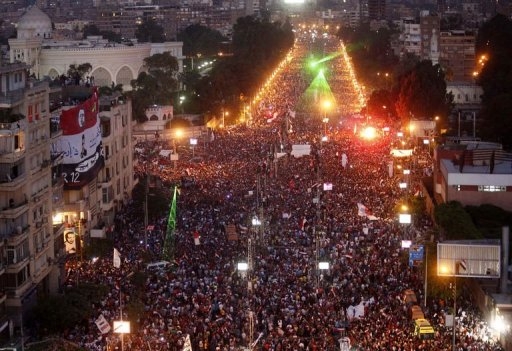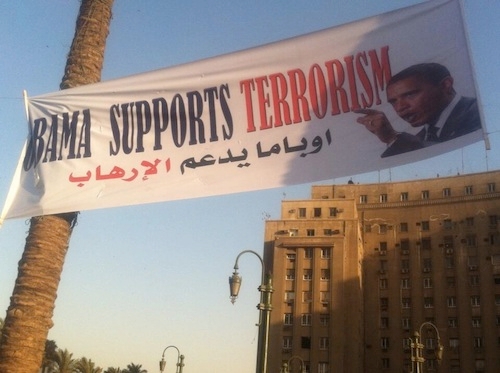What REALLY Caused the Coup Against the Egyptian President
05/07/2013 17:53

What REALLY Caused the Coup Against the Egyptian President
The protests in Egypt against president Mohammed Morsi were – according to the BBC – the largest in history.
The Egyptian military threw Morsi out in a coup today.
Why?
Irish Times reports:
Army concern about the way President Mohamed Morsi was governing Egypt reached tipping point when the head of state attended a rally packed with hardline fellow Islamists calling for holy war in Syria, military sources have said.
***
Mr Morsi himself called for foreign intervention in Syria against Mr Assad,leading to a veiled rebuke from the army, which issued an apparently bland but sharp-edged statement the next day stressing that its only role was guarding Egypt’s borders.
***
“The armed forces were very alarmed by the Syrian conference at a time the state was going through a major political crisis,” said one officer, whose comments reflected remarks made privately by other army staff. He was speaking on condition of anonymity because he was not permitted to talk to the media.
***
For the army, the Syria rally had crossed “a national security red line” by encouraging Egyptians to fight abroad, risking creating a new generation of jihadists, said Yasser El-Shimy, analyst with the International Crisis Group.
At the heart of the military’s concern is the history of militant Islam in Egypt, homeland of al-Qaeda leader Ayman al-Zawahri. The military source condemned recent remarks made by “retired terrorists” allied to Mr Morsi, who has deepened his ties with the once-armed group al-Gamaa al-Islamiya.
Obama had recently sent American troops to prop up Mursi, and the protesters were furious at the U.S. for backing Islamic radicals.
(The U.S. backed Egypt’s previous dictator, as well).
Support of Western intervention in Syria was also one of the main causes of the recent enormous protests in Turkey … which came close to toppling the Turkish leadership.
Indeed, the American government has been providing arms, money and logistical support to Al Qaeda inSyria, Libya, Mali, Bosnia and other countries – and related Muslim terrorists in Chechnya, Iran, andmany other countries. So moderate Arabs all over the Middle East and North Africa are becoming furious at U.S. interventionist policies.
Note: The coup is a set-back for the U.S. , because Egypt – unlike Iraq, Libya, Syria, and Iran – isn’t on the 20-year-old list of countries targeted for regime change.

ANTI-MUSLIM BROTHERHOOD PROTESTS IN EGYPT: LARGEST POLITICAL EVENT IN WORLD HISTORY
The demonstrations that began Sunday in Cairo, Egypt against the Muslim Brotherhood government of President Mohamed Morsi have attracted "millions" of supporters and many counter-demonstrators as well, making the protest the largest political event in the history of the world, according to the BBC.
The protests in Tahrir Square and throughout Egypt exceed those that ousted President Hosni Mubarak in 2011 in the key event of the Arab Spring. Two years later, after constitutional reforms and elections that saw Morsi and the Muslim Brotherhood move to aggrandize their power, the public backlash is immense.
The demonstrations pose a puzzle for President Barack Obama, who was touring South Africa at the other end of the continent when the demonstrations began. In 2011, Obama initially supported Mubarak, then threw his weight behind the protests and reached out to the Muslim Brotherhood on its way to power.
The Obama administration, through Ambassador Anne Patterson, actively discouraged Sunday's protests, as Breitbart News' Kerry Picket reported last week. "Egypt needs stability to get its economic house in order, and more violence on the streets will do little more than add new names to the lists of martyrs," she said.
Delivering an address at the University of Cape Town on Sunday night that was billed as the highlight of his three-nation tour, Obama touted Africa's movement towards democracy but did not mention the Cairo protests, and downplayed the U.S. intervention in Libya and the chaos that followed in its wake.
The Tahrir Square protests in Cairo bear echoes of recent protests in Turkey, as well as the "Cedar Revolution" that took place in Lebanon in 2005, and the "Green Revolution" of Iran in 2009, when citizens took to the streets to protest economic stagnation, religious oppression, and costly foreign entanglements.
Yet if the Cedar Revolution was partly inspired by the toppling of Saddam Hussein in Iraq, and the Green Revolution was partly inspired both by Iraq and the end of the Taliban regime in neighboring Afghanistan, the new protests in Cairo and Istanbul seem endogenous, fueled by popular discontent at Islamist rule.
There are counter-demonstrations in Egypt, too, as Muslim Brotherhood activists have been able to mobilize thousands of their own followers in protests of support for Morsi. The Egyptian army, which may hold the balance of power, has yet to intervene--but could do so in an attempt to restore stability.
'Obama Supports Terrorism': Egyptian Protests 'Anti-Obama' As Well As Anti-Morsi, CNN Reports

Many Americans have been cheering Egyptians along in their celebrations over the ouster of Muslim Brotherhood head Muhammed Morsi Wednesday afternoon, but as CNN reminded viewers, the protesters have also been aiming their opposition towards President Obama.
Noting that he’s seen images of signs claiming Obama “allied himself with terrorists, with the Muslim Brotherhood, with a fascist regime” anchor Jake Tapper asked Cairo-based CNN International correspondent Reza Sayah how prevalent the anti-American and “anti-Obama” imagery has been during these latest rounds of protests.
“It’s no secret that U.S. foreign policy is unpopular in, not just here in Egypt, but throughout the Arab world,” Sayah reported. “Egyptians love Americans, but they don’t love U.S. foreign policy. Remember, they will never forget that for decades, it was Washington that supported the dictator Hosni Mubarak and his brutal police state.”
Sayah added that the leaders of the opposition movement put out a “harsh” statement warning Washington to “stay out of Egypt’s affairs” and accusing the U.S. of “trying to impose its will on Egypt for the interest of Israel.”
“It’s a glimpse of how complicated Washington has it,” he concluded, “when it comes to Egypt and this region.”







